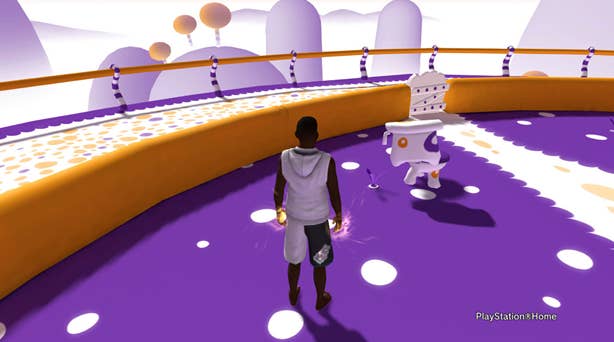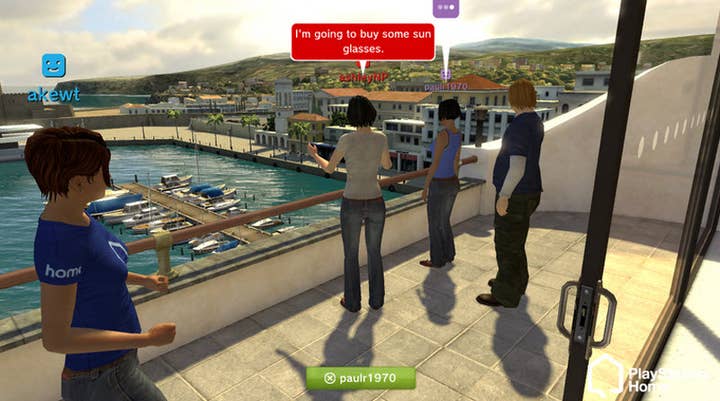PlayStation Home is dead, now what?
Home will be shutting down for good next year but virtual worlds will live on
Sony's PlayStation Home will cease publishing content next week, and by next March it will be shuttered completely. It's a sad time for the devoted core userbase and for the many developers who've actually come to rely on the virtual platform as a solid source of revenue. As nDreams CEO Patrick O'Luanaigh wrote recently, "we generated seven-figure revenues for several years from Home, and other studios did as well."
If Home did that well for developers, why wouldn't Sony want to continue it on PS4? Despite a core following, and a handful of developers who saw success with Home, it's hard to say if the virtual world actually paid off for Sony. Madmunki co-founder Dave Dow, whose studio made the successful Spunland for Home, speculated that Sony probably did turn a profit, but simply not enough of one.
"Sony was probably fronting too much of the cost. The operating costs had to be very high... As far as I know Home was profitable, but Sony's not really interested in profits of less than hundreds of millions," Dow told GamesIndustry.biz. "And Home was a lot of effort. I imagine it was not profitable enough for them. And I imagine it would be a massive pain for them taking on PS4. I've had a lot of conversations with people who've suggested that they use PlayStation Now and the back-end to continue it, but for whatever reason they didn't do that."
"People made sub-rate versions of [AAA games] for Home which wouldn't work right because it was never intended to do that. A lot of people spent money building stuff like that and it was a real blind alley"
Dave Dow, Madmunki
Indeed, the costs of maintaining a virtual world should not be underestimated. It takes money to make money. Linden Lab's Second Life has been operating for 11 years and is still profitable. While Home did not offer the scale and variety of something like Second Life, it's likely that Home still cost millions annually. "It's substantial. It's in the tens of millions of dollars. You can probably compare it to any MMO of significance," Linden Lab boss Ebbe Altberg said, describing Second Life's cost structure.
Home was actually ahead of its time. As Dow pointed out to us, Sony had initially been planning to launch it on PS2. The idea came about in a society that knew nothing of Facebook or Twitter. "Back then people were using dial-up... and Home launched in a world where no one used the terminology social network. It was something entirely new... I think a lot of people didn't really know what it was," he said.
And maybe that was the problem. As exciting as it was, many developers didn't properly take advantage, there were too many problems, and a lot of PlayStation 3 owners quickly lost interest.
"In the early days it was incredibly unsophisticated - to join a game was a nightmare. There was no feedback about if there was someone in the game or how long you might have to wait. And most spaces didn't have anything interactive, so I think a lot of the people who checked out Home early on lost interest quite quickly. And I think it got harder and harder for Sony to get any media traction as time went on and as they started getting better content, which came much further down the line," Dow continued.
"It's difficult to get attention after that unless you do something really major. When Home started out it was never meant to do what it did, and so usability-wise I think there was a hardcore group that loved it and did use it as a social network. There's a guy I know who spent over $10,000 in Home over five years, and there've been a number of stories like that. A side effect of that is when he boots up Home it takes him half an hour to load up because the system has to validate $10,000 worth of purchases. It was never structured with stuff like that in mind. Unless you were among the hardcore that just accepted that that's the way it was, you were always going to get put off by it."
Certainly spending thousands in Home is an extreme example, but the loading problems Dow alluded to were far too common, and it may have contributed to Home's challenges overall.
Lewis Ward, research director at IDC, remarked, "First, the load times were long and the frequent updates meant that you really had to like the experience to keep going back. Second, much of the premium content was either redundant with what the PS Store offered or was unique add-on or customization content that I didn't find all that compelling. Third - and this is more of a personal pet peeve that I shared with the Home team years ago - I didn't love how the avatar behaved and interacted with the world or other avatars. A microcosm of this is the fact that when you walked around, your shoes made no sound. It may sound silly but try watching a movie with all the post-production 'fake' footsteps missing. There were a lot of little details in Home that weren't quite right and that ultimately contributed to it failing to reach critical mass."

In the last couple years, there were noticeable improvements in quality with Home's content as studios like nDreams, Lockwood and Madmunki, among others crafted more engaging content, but it was probably too late for Sony. "We started Madmunki and created Spunland as attempt to expand what you could do in PS Home. People made sub-rate versions of [AAA games] for Home which wouldn't work right because it was never intended to do that. A lot of people spent money building stuff like that and it was a real blind alley. We approached it differently - you want gameplay that is quite social based and very easy to engage with. We built Spunland as a kind of ecosystem - it was completely driven by players," Dow noted.
With Sony essentially pulling the rug out from underneath developers' feet, Madmunki is aiming to create a new virtual world on PS4 called Neotopia. The team has the experience and even has Ed Gladwin (ex-Head of Commercial Development, SCEE Home) on board to help craft a virtual world that players and developers on Home should be comfortable with.
Neotopia, which is being built with Unreal, unfortunately only achieved about a fifth of its £250,000 funding goal in the recently ended Kickstarter, but Madmunki is currently pursuing other funding options. The good news is that Dow said building Neotopia will be a far easier endeavor than what Sony did with Home.
"We can do it an awful lot cheaper than Sony basically. We don't have to do something that works along with PSN and all the rest of it. Users can buy virtual currency from PSN but we'll handle all the items and things outside of it. With the advent of cloud computing the costs of servers have dropped radically and are continuing to drop, so the infrastructure side can be done [for much less money] than how Sony was doing it," he explained.
Beyond the lowered costs, Dow is still completely fascinated by virtual worlds and believe strongly in their future. "I had a conversation with an old boss of mine [about Facebook and Oculus] and I said PS Home is what they should do, and suddenly it just made sense. I was saying, 'Oh wow, you could create a virtual reality social network. You could imagine instead of having a wall, you have a room. And your friends can visit.' We started thinking about it and was like 'wow, someone's really going to do this. It's just a matter of time.' That's kind of what started the ball rolling [for us]," Dow said.
While Dow is pursuing his creative ambitions, he also acknowledges that Neotopia is something that's being built out of necessity. "For me as a developer, we've only scratched the surface of Home. There are a number of things we would have loved to have done. The bottom line is I would have rather that Sony just kept it going," he said.
It may take a few more years, but as Dow already alluded to, clearly the next major step to propel virtual worlds forward is VR. As Sony continues its work on Project Morpheus, Dow and other developers that he hopes will collaborate with him on Neotopia dream of a day where their creations contribute to a fully immersive virtual platform.
"Technically it should be easy for us to make it work with something like Morpheus. I think virtual worlds may become a lot more compelling at that time when you're experiencing it in VR. I can't wait for that moment," Dow enthused.
"having that sensation of being in world as opposed to looking at the world on your monitor - it's a game changer"
Ebbe Altberg, Linden Lab
Facebook may ultimately head down that path with Oculus too, and the VR trend hasn't gone unnoticed by the veterans of virtual worlds at Second Life.
"We're extremely excited about Oculus. We have already integrated the Oculus SDK with Second Life ... part of the reason we're doing a next generation platform is to make sure we solve for things [to make it work with VR]. When you architected a platform 10 years ago it wasn't obvious how you would solve for those things. We're not doing it to say Oculus and Second Life is the perfect marriage... but for us it's more of a learning phase," said Linden Lab's Altberg.
Whether a developer is building a game or a virtual world, VR completely changes everything. A new approach is required and that will take some time to perfect, Altberg added.
"Eventually quite a number of things will have to be done differently for the platform as well as how you create content. We want to make sure all these thousands and thousands of creators on the platform can appreciate what those things are in VR," he said. "We're hugely enthusiastic... I believe it's going to be huge. I was at Oculus Connect a few weeks back, and it's getting good. There are still some unanswered questions out there, like input - keyboard and mice or gamepads are not necessarily the obvious input. That'll take a while to shake out. But being inside the world of Second Life - having that sensation of being in world as opposed to looking at the world on your monitor - it's a game changer."
While some have been skeptical of Facebook's Oculus purchase, a side effect of the deal is that VR and virtual worlds will suddenly get a lot more attention, and that can only be a good thing for Second Life, Neotopia and any other worlds that spring up in the near future.
"What Oculus is doing is bringing a lot of extra energy and money into the whole sector we've been in for so long, and at times it's felt kind of lonely. So we'll probably have a lot more competition now over the next several years but I also think you'll see more rapid advancements in input devices and other technologies that will help us create a better experience," Altberg said.

